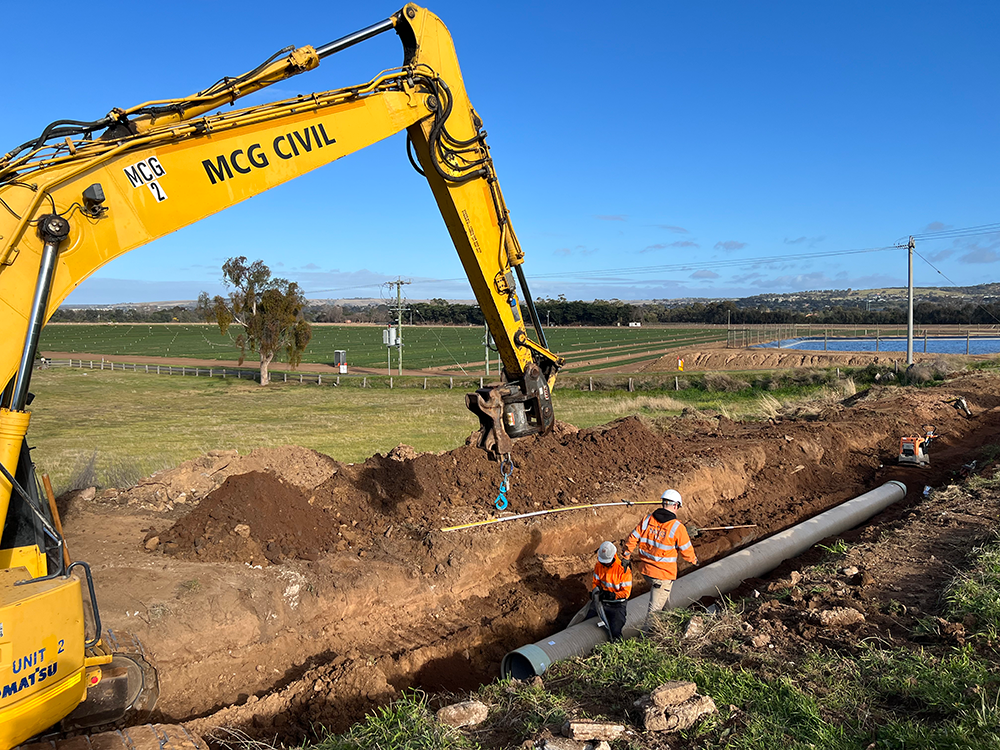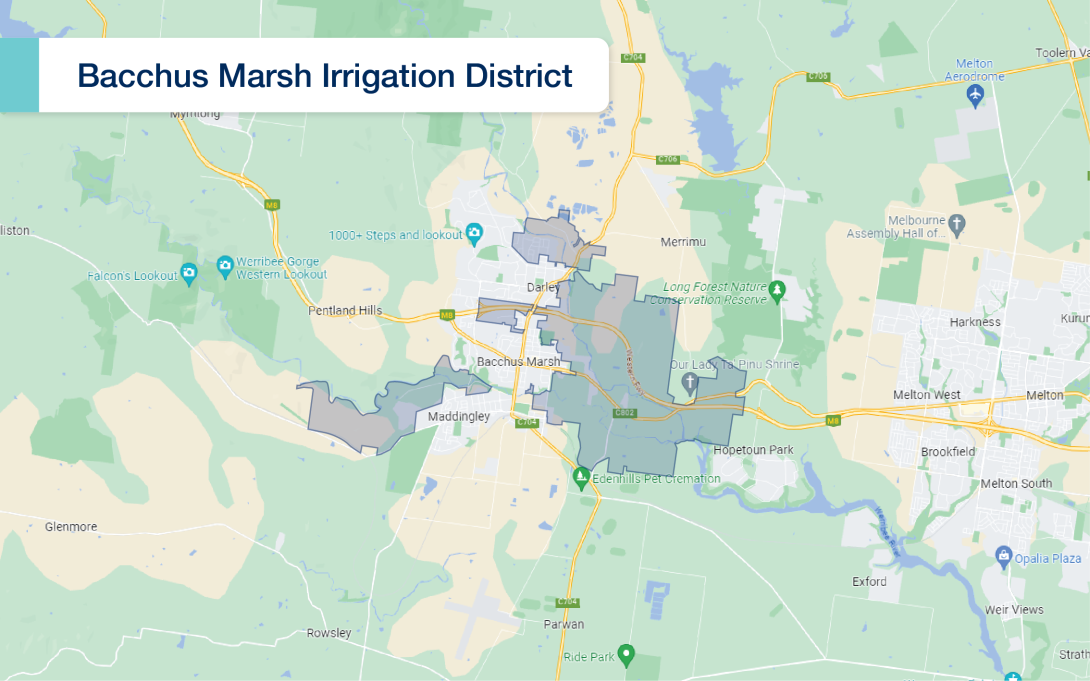The Bacchus Marsh Irrigation District is an important agricultural region located in Bacchus Marsh, Victoria, approximately 50 km northwest of Melbourne.
It is known for its high-value horticulture, particularly fruit and vegetable production. The district supplies fresh produce to Melbourne markets, supermarkets, and exports.
The district covers about 1,000 hectares of farmland, producing a variety of fruits and vegetables. Major crops include strawberries, apples, pears, peaches, nectarines, lettuce, broccoli, cauliflower and carrots.
The district primarily sources water from the Werribee River and Pykes Creek Reservoir.

Order water over the phone or online using Waterline. Head to our water ordering page to find out more.
-
History
Settlement of the Werribee River basin began with the development of Melbourne and, by the middle of the 1860s, private schemes to irrigate sections of farms with river frontages had been established. Because these schemes relied on natural river flows, however, they were limited in their extent and reliability.
Extensive survey works began in 1867 by the then Victorian Water Supply Department. When the survey was completed, an ambitious development proposal was put forward, but was never approved due to the high cost. Private irrigation schemes therefore continued for the next 30 years.
In April 1889, the Bacchus Marsh Irrigation and Water Supply Trust was formed. The irrigation district comprised of 283 hectares of land on the banks of Parwan Creek. Water was also supplied to the township of Bacchus Marsh.
Following this, the Lerderderg Irrigation Trust was formed in April 1890, to irrigate 810 hectares of river flats along the banks of the Lerderderg River. However, no works were constructed as the Trust decided that the expense involved could not be justified.
Under the provisions of the Water Act of 1905, the Lerderderg Irrigation Trust was abolished and the Bacchus Marsh Irrigation and Water Supply District was transferred to the newly-formed State Rivers and Water Supply Commission.
Development began under the control of the Water Commission. A new diversion weir on the Werribee River was completed in 1910 and a new main channel was completed in the following year. This channel increased the area supplied with water to 1,330 hectares. Supply channels to serve this additional area were completed in 1913.
The demand for irrigation supplies steadily increased and in 1911 Pykes Creek Reservoir the first storage on the Werribee River – was completed. An additional main channel was completed in 1929 to supply 400 hectares of high land adjacent to the older irrigation areas. The original channels were lined with concrete between 1920 and 1934.
In the early 1960s, a program of progressive pipe-lining began in the BMID. The main channel was progressively enlarged and its banks raised for a length of 300 metres near the township to prevent flooding of private land. In 1970, the township section was abandoned due to urban development.
What is individual carryover?
With individual carryover, all water held in the reservoirs will be allocated to you in the current season. Southern Rural Water will not store water for future years.
Any unused water in your Allocation Bank Account (ABA) will remain in your account for you to use in the new season, according to these rules:
The maximum volume of water that you can carry over from season to season is the total volume of your high and low reliability water shares. 15% is automatically taken off at the end of a season to account for the evaporation that occurs from the reservoirs.
In any season, the maximum volume that can be allocated to you is equal to the total volume of your water shares – this includes any carryover.



-
Modernisation

We began modernising the Bacchus Marsh Irrigation District in December 2017 and completed the work in August 2023.
The modernisation project involved reconfiguring the irrigation network that supplies Bacchus Marsh growers to remove ageing and inefficient infrastructure. We replaced old manual and channel-based irrigation networks with modern, automated pipelines and outlets.
Our modernisation works has increased the reliability of irrigation supply and helped farmers be more resilient in an increasingly drier climate.
The works were completed in five stages.
Stage 1: Construction of a new pump station at Maddingley.
Stages 2A, 2B and Stage 3: Construction of 6.4km of pipeline, automation of four outlets and decommissioning of 1km of pipeline.
Stage 4: Construction of 2.75km of pipeline and automation of a further three outlets. In partnership with Moorabool Shire Council, this stage supported a 4.5-kilometre aqualink cycling and walking corridor connecting the Lerderderg River and Werribee River corridors.
Stage 5: Replacement of the supply system. Piping the spur 12 channel to improve reliability of supply and reduce evaporation, generate an additional 100 ML in annual water saving, improve water efficiency and service to customers via more accurate and timely delivery of irrigation water.
Stages 1 to 4 generated 1,380 ML in water savings, above the target of 1,000 ML, with 50 percent going to the environment and 50 percent returned to irrigators.
Modernisation was jointly funded by Southern Rural Water, the Australian Government through the National Water Grid Fund and the Victorian Government.
-
Operations
The Bacchus Marsh Irrigation District (BMID) now receives its irrigation supply via a weir on the Werribee River just east of Ballan, which diverts water via a tunnel and Myers Creek to Pykes Creek Reservoir.
Water from Pykes Creek Reservoir is released into the Werribee River via the Korweinguboora Creek. A second diversion weir located west of Bacchus Marsh on the Werribee River diverts to Werribee Vale Road customers and also via the Maddingley pump station to the rest of the BMID.
Like Werribee and the Macalister Irrigation District in Gippsland, Bacchus Marsh is a gravity irrigation district and relies on upstream heads of water to move supply through the channels and pipes to customers.
Customers order water through Southern Rural Water’s Waterline ordering system. It is then delivered by our Water Services Officers through a complex series of checks, regulators and valves. This brings the water to the customer property where it is measured either by a dethridge wheel on open channels or a standard flow meter on pipelines. From here it is directed by the customer, often into storage dams and then into on-farm irrigation systems.
Prices for water in the BMID are determined by the Essential Services Commission following recommendation by the Southern Rural Water Board. This recommendation is made following consultation with the Werribee Bacchus Marsh Customer Consultative Committee, which is made up of customers from within the district.
-
Bacchus Marsh Winter irrigation roster
To enable our customers to plan winter irrigation requirements in conjunction with Southern Rural Water’s winter maintenance activities, please note the following winter irrigation roster, which runs from May to the end of September.
Providing there is enough demand, water supply will be available to irrigators in the Bacchus Marsh Irrigation District from Monday to Friday during the season.
*Note:
We can only run the system once we have enough orders to ensure a flow rate above 15 ML per day.Please place your order on Waterline at or contact the 24-hour telephone Water Ordering Service on 1300 360 117. You will need to place your orders at least two business days before the water is required
-
Private works
If you want to do works around (near, on or over) infrastructure controlled by Southern Rural Water – including open channels, pipelines and drains – you will need a licence to construct and use private works.
These structures can include:
- Occupational crossings
- Siphons
- New or replacement outlets
- Power or water lines
- Pivot crossings
- Or any other structures
How do I apply for a licence?
- Contact our Land Management Coordinator to discuss your plan. This will include an on-site meeting.
- Submit an application form: Request for the Approval of Private Works (no payment is needed up front)
- If approved, we will send you a written agreement with a request for fees for you to sign and send back with payment
- Once we have received this and approved the agreement, works can start
- During the project, our Land Management Coordinator will inspect regularly to check progress and that you are complying with specifications.
Security deposit
Part of the fee is a security deposit, which we will refund when the project is completed to the required standard and specifications.
Compliance
Please note that failure to comply with our processes and requirements is a breach of Section 148 of the Water Act 1989, and could result in prosecution.
-
Location
The Bacchus Marsh Irrigation District (BMID) is located around the community of Bacchus Marsh, some 55 km north-west of Melbourne on a flood plain of the Werribee River.
At the time of European settlement, this region was a large swamp. It is now a highly developed agricultural district specialising in horticulture and market gardening.

Related pages
Click on these related pages to discover more about our modernisation projects, find related application forms and the current BMID and WID Allocations.

